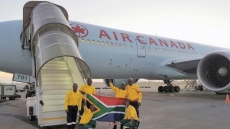OTTAWA — Weary Liberals limped into June after a bruising stretch punctuated by the apologies of Elbowgate, a lacklustre G7 summit in Japan, backtracking on proposals to control the House of Commons and a blown deadline for the new assisted-dying bill.
The resignation of Fisheries Minister Hunter Tootoo and a climb-down on how to handle electoral reform capped off the week.
Does any of the turmoil affect how Canadians go about their lives and interact with federal politics, or drown out other issues?
Clearly, the developments on electoral reform matter to democracy. But also deserving of attention are new details about how the government regulates cosmetics, and provocative Conservative questions about how new social policy will affect divorced parents.
Here are three ways politics affected us this week:
ELECTORAL REFORM: The Liberals changed direction on Thursday and decided to accept an NDP plan to restructure a parliamentary committee that will look at how to change the way MPs are elected. On the surface, it sounds procedural. But the NDP plan means the Liberals will lose their majority on the committee.
That means a rough ride for the option of a ranked or preferential ballot system said to be preferred by many Liberals — especially since the NDP, the Conservatives and Green party Leader Elizabeth May oppose it. But the NDP's inclination to push for proportional representation probably can't garner majority support either.
Does a referendum — the favoured position of the Conservatives, but an approach the other parties believe to be a path towards keeping the status quo — become the default?
Even as the NDP celebrates its victory, at least a few Liberal MPs are muttering quietly that their attempts at electoral reform may not materialize.
TAKING LIPSTICK OFF A PIG: Environment commissioner Julie Gelfand, who regularly audits the government's environmental policies, has taken a hard look at the regulation of cosmetics. In a report issued this week, Gelfand finds that consumers are pretty much on their own when it comes to figuring out if the makeup and beauty products are safe.
Health Canada does not require the industry to report health and safety incidents. Any monitoring of the risks of products bought on-line was almost non-existent. Counterfeit products are not scrutinized. And marketing terms such as hypoallergenic, preservative-free, fragrance-free or unscented don't have any standing with the government in terms of health and safety.
Health Canada does issue a list of restricted and prohibited chemicals for the industry to refer to, but it's up to the industry to follow the rules. And it's up to consumers to know which chemicals may pose risks.

DIVORCED PARENTS: The Liberals are hoping public discourse in the month of June will be consumed with talk of their new child benefit. The new benefit will start in a few weeks, and will replace the universal child care benefit and the Canada child tax benefit put in place by the previous Conservative government.
The Liberal benefit is income tested, and will start at $6,500 a year for a child under five, or $5,400 a year for children six to 17.
Conservative finance critic Lisa Raitt argued this week that the budget that introduced the new benefit was silent on how divorced parents should split the benefit or include it in their support payments — a problem that could affect 1.2 million Canadians.
Finance Minister Bill Morneau has since responded that there will be no impact on support payments, and the structure of the new benefit will be much like the old benefits.
Still, Raitt's questions point to a huge demographic — divorced parents — that is rarely examined on its own when it comes to social policy, experts say.
This year's census, to be released in 2017, will no doubt show that the divorced demographic is more of a force than ever.




